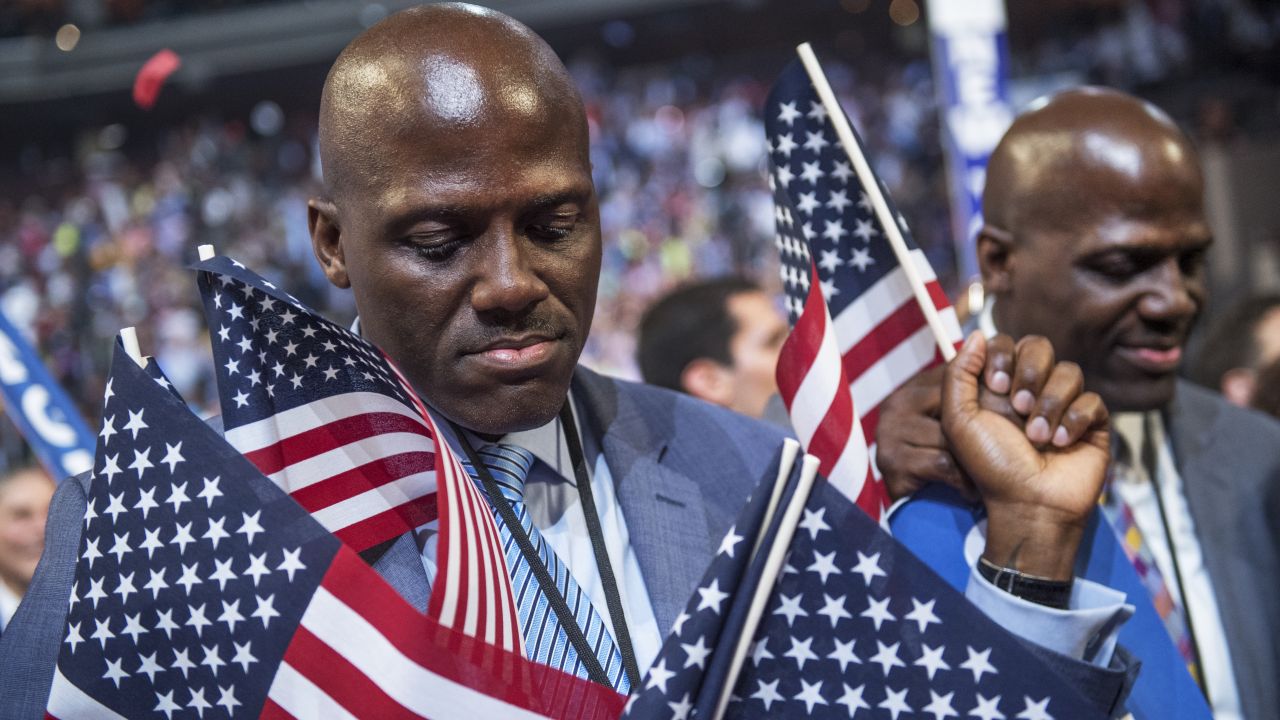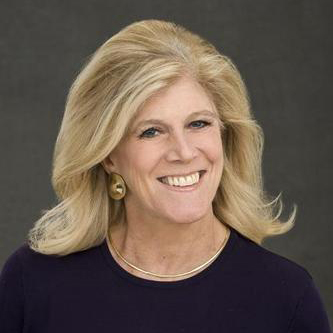
Delegates bow their heads in prayer on the floor of the Wells Fargo Center in Philadelphia on the final night of the Democratic National Convention, July 28, 2016. (Photo By Tom Williams/CQ Roll Call)
When in doubt, wave the flag.
“I love this country!” Donald Trump roared last March during a spirited rally in Ohio. “I’ve done great … We’re going to make America great again … It’s payback time!” When asked a few days earlier to explain the vitriol and violence at some of his gatherings, the man who alleges he’d put “America First” (as if anything could come before himself) attributed the same patriotic zeal (minus the financial factor) to his supporters: “People come with tremendous passion and love for the country. When they see what’s going on in this country, they have anger that’s unbelievable. … There’s also great love for the country. It’s a beautiful thing in many respects.”
Except to the folks who got punched.
Contrast that to the warmer, fuzzier response of a clearly exhausted Hillary Clinton during the 2008 New Hampshire primary, when a woman asked how she kept at it day after day after day: “I couldn’t do it if I just didn’t passionately believe it was the right thing to do,” Clinton said, her voice breaking. “I have so many opportunities from this country and I just don’t want to see us fall backwards. This is very personal for me.” Headlines claimed Clinton wept; she did not. But her unusually emotional comments continued. “It’s about our country, it’s about our kids’ futures, it’s really about all of us together. … I just believe so strongly in who we are as a nation, so I’m going to do everything I can to make my case, and then the voters get to decide.”
So, how to decide? Which party is more — well, American? What’s a patriot anyway?
Alexander Hamilton, our current favorite Founding Father, was wary of red, white and blue rhetoric, and scolded a colleague in the Continental Congress for using the Revolution to launch a business opportunity: “There are seasons in every country when noise and impudence pass current for worth,” he wrote, “and in popular commotions especially, the clamors of interested and factious men are often mistaken for patriotism.”
It’s even worse when symbols are mistaken for substance.
Those flag pins embedded in so many political lapels began with President Nixon, spawned by the culture wars that erupted during the real and divisive war in Vietnam. Since flags are the ultimate optics, you didn’t have to look beyond the tiny stars and stripes to know who supported the war, the military and the police, all pillars of a reliable Republican base. Never mind that anti-war protesters (who tended to clash with police and favor military cuts) considered their dissent an equal act of patriotism. During one such demonstration in 1968, activist Abbie Hoffman literally wrapped himself in the flag by wearing a shirt that looked as if it were sewn from one, and promptly got arrested. “I regret that I have but one shirt to give to my country,” Hoffman said at his sentencing, but the humor was lost in the hostility. For the next few decades, Republicans owned both the imagery and the illusion, a bond cemented viscerally during the 1988 campaign when George H.W. Bush campaigned at an actual New Jersey flag factory.
Of course, Bush was toeing the yellow brick line paved by his predecessor, Ronald Reagan, whose cheery patriotism promised to uplift Americans from the doldrums of the Carter years. Reagan swept into office in 1980, partly on the heels of President Jimmy Carter’s career-ending “malaise” speech, a thoughtful address in which Carter never used that word but did examine the erosion of moral and spiritual values in America during the energy crisis brought on by OPEC. He called it a “crisis of confidence,” and put forth a plan for gasoline conservation that he cast as “an act of patriotism.” But self-reflection didn’t sell, and we woke up to President Reagan’s “Morning in America,” an eight-year term he later summed up as “a resurgence of national pride.” Hearkening back to the “different America” of his youth, the outgoing president lamented that “some things have changed,” that an “unambivalent appreciation of America” was no longer being taught; that “well-grounded patriotism is no longer the style” of popular culture.
It was and is a seductive fantasy, a turn-back-the-clock yearning to honor an often mythical America that has long been embraced by Republicans and conservatives. Democrats and liberals, on the other hand, have tended to remember the past as something less than ideal (for minorities and women, just for example), focusing more on the future, when the promise of the nation’s greatness will finally shine through, after a lot of hard work.
Until now.
Last month in Philadelphia, Democrats recaptured the flag, a game-changing moment in American politics created by a smartly produced narrative full of cops and generals and war veterans and a Gold Star Muslim father who waved a copy of the Constitution. The message was energetic and upbeat and full of American flags — paraded on the stage, flashed on the screens, printed on state delegation signposts, even embedded on the dress worn by Meryl Streep. No arrests were made.
It seemed so unfamiliar to the historically less heart-pounding Democrats that when the crowd burst into “USA! USA!” during four-star Gen. John Allen’s speech, one delegate stood up and yelled, “Stop that! That’s a Trump chant!”
As the editor of National Review tweeted in dismay, “they’re trying to take all our stuff.”
Here’s the thing: That stuff belongs to all of us. In flipping the script the Democrats have finally figured out that true patriotism is as inclusive as it is inquisitive, as star-spangled as it is cynical. Far beyond the blind acceptance of “My country, right or wrong,” it’s always a moving target, a work in progress, just like the country itself. Alexander Hamilton — this time as imagined by Lin-Manuel Miranda — nailed it when he rapped, “America, you great unfinished symphony.”
In fact, the grace notes already exist in another song sung by both parties at their conventions. Full disclosure: I’ve written a book about “America the Beautiful” because I believe its soaring patriotism best defines the country I, too, love. Because the poem, written by Katharine Lee Bates, celebrates far more than the physical beauty of this land, “from sea to shining sea.” Get beyond the first verse and it’s a song about a land and its people — not flags; it’s about potential, America as it was and as it can be. And it’s not the vain optimism of empty promises; rather, an imperfect entity that can be fixed.
America! America!
God mend thine every flaw,
Confirm thy soul in self-control,
Thy liberty in law.
Radical, no, to suggest that the motherland is flawed? And then, with perfect pitch, to seek help, both divine and human, in tempering our free spirits with “self-control” and protecting our precious freedom with the reason of law. This is far from the fear-inducing, dystopian image presented by Donald Trump, with its “I alone can fix it” arrogance and its knee-jerk demand for “law and order.” Remember, Bates calls for self-control. And then, the kind of sacrifice that soldiers like Humayun Khan have made.
O beautiful for heroes proved
In liberating strife,
Who more than self their country loved,
And mercy more than life!
She’s not glorifying war here, but honoring the individuals who fought them. No room for narcissism when you love your country more than yourself.
Bates wrote and re-wrote these words during the excesses of the Gilded Age, a period lately compared to our own with its greed, corruption and yawning chasm between the haves and have-nots. As I said, a work in progress:
America! America!
May God thy gold refine
Till all success be nobleness,
And every gain divine!
Nothing wrong with material success, the poet is saying. She was awed by the extraordinary industrial progress she saw at the turn of the 19th century. She just wants it channeled into nobler causes.
As she did herself.
When the first version of the poem “America the Beautiful” was published in 1895, Americans immediately wanted to sing it, finding suitable melodies in hymnals and songbooks to accompany the words. The tune that stuck was written by church organist Sam Ward, who died without knowing of his treasured contribution to the American spirit. Bates died in 1929, at the age of 69. And beyond the $5 she received on its first publication, she refused to take any further royalties. “It belongs to all Americans whose feeling for America it expresses,” she said.
That’s my kind of flag-waving.




